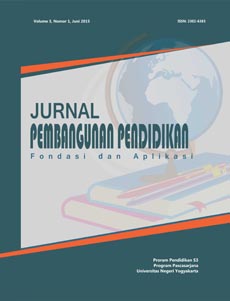Membangun empati di era eksponensial melalui norma sosiomatematika
DOI:
https://doi.org/10.21831/jppfa.v10i1.29357Keywords:
Empati, era eksponensial, norma sosiomatematika, empathy, exponential era, sociomathematical normsAbstract
Penelitian ini bertujuan untuk menganalisis upaya membangun rasa empati pada peserta didik melalui pembelajaran matematika. Era eksponensial merupakan era dengan perkembangan teknologi yang sangat cepat. Perkembangan teknologi menjadi penyebab problem menurunya empati pada diri manusia. Melalui penelitian kualitatif dengan studi literatur digambarkan secara jelas, objektif, sistematis, analitis dan kritis untuk menumbuhkan empati melalui norma sosiomatematika. Data yang dijadikan sebagai literatur merupakan artikel-artikel penelitian yang diterbitkan pada jurnal nasional maupun internasional bereputasi. Pengumpula data menggunakan bantuan mesin pencari Google Scholar dengan kata kunci "empathy in education". Hasil penelitian ini menunjukan bahwa norma sosiomatematika dapat menumbuhkan rasa empati. Perhatian terhadap argumentasi yang dipaparkan oleh peserta didik dapat memunculkan rasa empati. Empati dapat menumbuhkan persahabatan dan memudahkan kerjasama. Diharapkan guru dalam mengembangkan model pembelajaran matematika memperhatikan bagaimana norma-norma sosiomatematika yang terbentuk. Salah satu alternatif model pembelajaran yang ditawarkan yaitu model pembelajaran matematika yang mengakomodasikan budaya lokal. Budaya yang telah terbukti memiliki nilai-nilai luhur untuk mengatur kehidupan bersama dalam masyarakat.
Abstract
This study analyzes efforts to build empathy in students through learning mathematics. The exponential era is an era with very fast technological developments. Technological developments cause the problem of decreasing empathy in humans through qualitative research with literature studies described clearly, objectively, systematically, analytically, and critically to foster empathy through sociomathematical norms. The data used as literature are research articles published in reputable national and international journals. The data collectors used the help of the Google Scholar search engine with the keywords "empathy in education". The results of this study indicate that sociomathematical norms can foster a sense of empathy. Attention to the arguments presented by students can create a sense of empathy. Empathy can foster friendship and facilitate cooperation. Teachers in developing mathematics learning models are expected to pay attention to how sociomathematical norms are formed. One alternative learning model offered is a mathematics learning model that accommodates local culture. A culture that has been proven to have noble values regulates life together in society.
References
Abadi, T. W., Sukmawan, F., & Utari, D. A. (2016). Media sosial dan pengembangan hubungan interpersonal remaja di Sidoarjo. KANAL: Jurnal Ilmu Komunikasi, 2(1), 95–106. https://doi.org/10.21070/kanal.v2i1.278
Amaliah, D., Sariyatun, S., & Musaddad, A. A. (2018). Values of Piil Pesenggiri: Morality, Religiosity, Solidarity, and Tolerance. International Journal of Multicultural and Multireligious Understanding, 5(5), 179–184. https://doi.org/10.18415/ijmmu.v5i5.340
Christakis, N. A., & Fowler, J. H. (2007). The spread of obesity in a large social network over 32 years. New England Journal of Medicine, 357(4), 370–379. https://doi.org/10.1056/NEJMsa066082
Cooper, B. (2011). Empathy in Education: Engagement, Values and Achievement. Continum International Publishing Group.
Dalmeri, D. (2014). Pendidikan untuk pengembangan karakter (telaah terhadap gagasan Thomas Lickona dalam educating for character). Al-Ulum: Jurnal Studi Islam, 14(1), 269–288. https://journal.iaingorontalo.ac.id/index.php/au/article/view/260
Davis, M. H. (2018). Empathy: A social psychological approach. Routledge.
Feshbach, N. D., & Feshbach, S. (2011). Empathy and education. In J. Decety & W. Ickes (Eds.), The social neuroscience of empathy. MIT Press.
García-Pérez, R., Santos-Delgado, J.-M., & Buzón-García, O. (2016). Virtual empathy as digital competence in education 3.0. International Journal of Educational Technology in Higher Education, 13(1), 30. https://doi.org/10.1186/s41239-016-0029-7
Harun, C. Z. (2013). Manajemen pendidikan karakter. Jurnal Pendidikan Karakter, 3, 302–308. https://doi.org/10.21831/jpk.v0i3.2752
Hayat, M. S., Sutarno, S., & Erwin, E. (2017). Lorong waktu revolusi saintifik pada era eksponensial. Titian Ilmu: Jurnal Ilmiah Multi Sciences, 9(1), 41–50. https://doi.org/10.30599/jti.v9i1.80
Hoffman, M. L. (1970). Conscience, personality, and socialization techniques. Human Development, 13(2), 90–126. https://doi.org/10.1159/000270884
Indrawan, A. F. (2017, July 18). Bully semakin menjadi, pengamat: Perlu dibangun empati ke sesama. DetikNews. https://news.detik.com/berita/d-3563680/bully-semakin-menjadi-pengamat-perlu-dibangun-empati-ke-sesama
Jesson, J., Matheson, L., & Lacey, F. M. (2011). Doing your literature review: Traditional and systematic techniques. SAGE Publications.
Kau, M. A. (2010). Empati dan perilaku prososial pada anak. Jurnal Inovasi, 7(3), 1–8. https://ejurnal.ung.ac.id/index.php/JIN/article/viewFile/771/714
Lickona, T. (1996). Eleven principles of effective character education. Journal of Moral Education, 25(1), 93–100. https://doi.org/10.1080/0305724960250110
Mascolo, M. F. (2009). Beyond student-centered and teacher-centered pedagogy: Teaching and learning as guided participation. Pedagogy and the Human Sciences, 1(1), 3–27. https://scholarworks.merrimack.edu/phs/vol1/iss1/6/
Masuda, N., & Santos, F. C. (2019). A mathematical look at empathy. ELife, 8, e47036. https://doi.org/10.7554/eLife.47036
Miles, M. B., Huberman, A. M., Saldaña, J., & Saldana, J. (2019). Qualitative data analysis: A methods sourcebook (3rd ed.). SAGE Publications, Inc. https://books.google.co.id/books?id=lCh%5C_DwAAQBAJ
Muhtadi, A. (2008). Pengembangan empati anak sebagai dasar pendidikan moral. In Universitas Negeri Yogyakarta. Universitas Negeri Yogyakarta. http://staffnew.uny.ac.id/upload/132280878/penelitian/2.+Pengembangan+Empati+Anak+sebagai+dasar+pendidikan+moral.pdf
Mustari, M. (2011). Nilai karakter refleksi untuk pendidikan (T. Rahman (ed.)). Laksbang Pressindo.
Muzakki, A. (2018). Introducing local genius-based harmony education (Piil Pesenggiri) among the indigenous people of Lampung. Penamas, 30(3), 261–280. https://doi.org/10.31330/penamas.v30i3.188
Nawawi, A. (2018). Pentingnya pendidikan nilai moral bagi generasi penerus. INSANIA : Jurnal Pemikiran Alternatif Kependidikan, 16(2), 119–133. https://doi.org/10.24090/insania.v16i2.1582
Nishida, T. (2013). Toward mutual dependency between empathy and technology. AI & SOCIETY, 28(3), 277–287. https://doi.org/10.1007/s00146-012-0403-5
Organisation for Economic Co-operation and Development. (2019). PISA 2018 results combined executive summaries volume I, II & III. OECD. https://www.oecd.org/pisa/Combined_Executive_Summaries_PISA_2018.pdf
Parker, J. G., & Gottman, J. M. (1989). Social and emotional development in a relational context: Friendship interaction from early childhood to adolescence. In T. J. Berndt & G. W. Ladd (Eds.), Peer relationships in child development (pp. 95–131). Wiley. https://www.researchgate.net/publication/232444421_Social_and_emotional_development_in_a_relational_context_Friendship_interaction_from_early_childhood_to_adolescence
Pinasti, D. A., & Kustanti, E. R. (2017). Hubungan antara empati dengan adiksi smartphone pada mahasiswa Fakultas Ilmu Budaya dan Fakultas Sains dan Matematika Universitas Diponegoro Semarang. Jurnal Empati, 7(3), 183–188. https://doi.org/10.14710/empati.2017.19747
Rahayu, B. A., & Permana, I. (2019). Bullying di sekolah : Kurangnya empati pelaku bullying dan pencegahan. Jurnal Keperawatan Jiwa, 7(3), 237–246. https://doi.org/10.26714/jkj.7.3.2019.237-246
Ramdhani, N. (2016). Emosi moral dan empati pada pelaku perundungan-siber. Jurnal Psikologi, 43(1), 66–80. https://doi.org/10.22146/jpsi.12955
Rogers, C. R. (1975). Empathic: An unappreciated way of being. The Counseling Psychologist, 5(2), 2–10. https://doi.org/10.1177/001100007500500202
Rohbeck, J. (2019). Empathy with future generations? A historical approach to global justice. In R. G. Aguilar (Ed.), Empathy: Emotional, Ethical and Epistemological Narratives (pp. 178–202). BRILL. https://doi.org/10.1163/9789004398122_015
Rossi, P. G., & Fedeli, L. (2015). Empathy, education and AI. International Journal of Social Robotics, 7(1), 103–109. https://doi.org/10.1007/s12369-014-0272-9
Shodiq, S. F. (2017). Pendidikan karakter melalui pendekatan penanaman nilai dan pendekatan perkembangan moral kognitif. At-Tajdid : Jurnal Pendidikan Dan Pemikiran Islam, 1(1), 14–25. https://doi.org/10.24127/att.v1i01.332
Snyder, H. (2019). Literature review as a research methodology: An overview and guidelines. Journal of Business Research, 104(March), 333–339. https://doi.org/10.1016/j.jbusres.2019.07.039
Stephan, M. (2014). Encyclopedia of mathematics education (S. Lerman (ed.)). Springer Netherlands. https://doi.org/10.1007/978-94-007-4978-8
Sudrajat, A. (2011). Mengapa pendidikan karakter? Jurnal Pendidikan Karakter, 1(1), 47–58. https://doi.org/10.21831/jpk.v1i1.1316
Sy, D. S. R. (2021). Etnopedagogi muhasabah sebagai pendidikan karakter peserta didik di MTS Ma'arif Fatahillah Sindang Anom Kec. Sekampung Udik Kab. Lampung Timur [Universitas Islam Negeri Raden Intan Lampung]. http://repository.radenintan.ac.id/15392/1/PERPUS PUSAT BAB 1 DAN 2.pdf
Terry, C., & Cain, J. (2016). The emerging issue of digital empathy. American Journal of Pharmaceutical Education, 80(4), 58. https://doi.org/10.5688/ajpe80458
Walker, G., & Weidenbenner, J. V. (2019). Social and emotional learning in the age of virtual play: technology, empathy, and learning. Journal of Research in Innovative Teaching & Learning, 12(2), 116–132. https://doi.org/10.1108/JRIT-03-2019-0046
Warren, C. A. (2018). Empathy, teacher dispositions, and preparation for culturally responsive pedagogy. Journal of Teacher Education, 69(2), 169–183. https://doi.org/10.1177/0022487117712487
Watie, E. D. S. (2016). Komunikasi dan media sosial (communications and social media). Jurnal The Messenger, 3(2), 69–74. https://doi.org/10.26623/themessenger.v3i2.270
Widodo, S. A., & Purnami, A. S. (2018). Mengembangkan norma sosiomatematik dengan team accelerated instruction. NUMERICAL: Jurnal Matematika Dan Pendidikan Matematika, 2(1), 13–20. https://doi.org/10.25217/numerical.v2i1.238
Wijaya, A. (2009). Permainan (tradisional) untuk mengembangkan interaksi sosial, norma sosial dan norma sosiomatematik pada pembelajaran matematika dengan pendekatan matematika realistik. Aljabar, Pengajaran Dan Terapannya, 97–106. https://eprints.uny.ac.id/7425/1/m-9.pdf
Yackel, E., & Cobb, P. (1996). Sociomathematical norms, argumentation, and autonomy in mathematics. Journal for Research in Mathematics Education, 27(4), 458–477. https://doi.org/10.5951/jresematheduc.27.4.0458
Yusuf, H. (2010). Dimensi aksiologis filsafat hidup piil pesenggiri dan relevansinya terhadap pengembangan kebudayaan daerah Lampung. Jurnal Filsafat, 20(3), 281–302. https://doi.org/10.22146/jf.3423
Zhou, M. Y., & Brown, D. (2017). Educational learning theories. https://sadil.ws/bitstream/handle/123456789/433/ALG Educational Learning Theories.pdf?sequence=1&isAllowed=y
Zych, I., Ttofi, M. M., & Farrington, D. P. (2019). Empathy and callous–unemotional traits in different bullying roles: A systematic review and meta-analysis. Trauma, Violence, & Abuse, 20(1), 3–21. https://doi.org/10.1177/1524838016683456
Downloads
Published
How to Cite
Issue
Section
Citation Check
License
The Authors submitting a manuscript do so on the understanding that if accepted for publication, copyright publishing of the article shall be assigned to Jurnal Pembangunan Pendidikan: Fondasi dan Aplikasi
 | Jurnal Pembangunan Pendidikan: Fondasi dan Aplikasi by https://journal.uny.ac.id/index.php/jppfa is licensed under a Creative Commons Attribution-ShareAlike 4.0 International License. |














